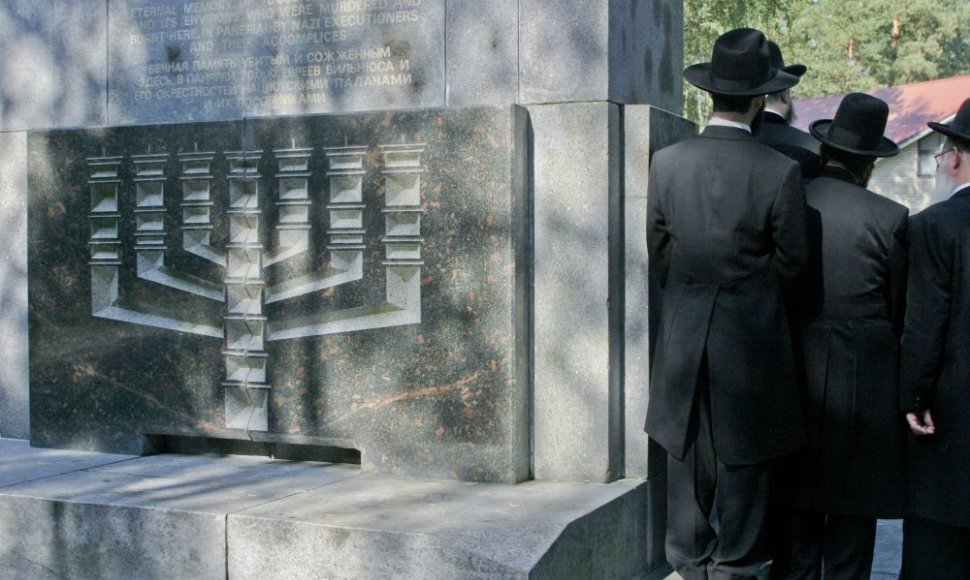I went to Lithuania to connect to my Jewish family past. I wanted to breathe in the summer light of the vast Baltic sky in my ancestral town of Rokiškis, in the far northeast corner of the country. I wanted to walk down the lane still called Synagogue Street, where my great-grandfather used to pore over the Talmud.
I didn't expect to encounter an elderly gentile man intent on speaking to a Jew before he died. But I did.
In 1941, as a boy of 17, Steponas had watched as the Jews of the Rokiškis region, including some of my relatives, were assembled and driven into the forest to be shot. His memories had tormented him all his life. He wanted to speak to a Jew before he died.
Would I be that Jew?
I have to say I was not eager to be that Jew. I knew that Lithuania's Jewish population had been massacred with a swiftness and thoroughness unusual even for that dreadful time. What had this man done, and what did he want from me?
In the end, however, I agreed to listen. I'm glad I did.
Steponas emerged from a cottage with a steep tin roof and got in the car with my guide and me. As we drove slowly through the town, he pointed to the left and the right.
"The Jews were marched here," he said. "They were told that if they did not give up their valuables, they would be drowned in the pond.
"I drove my wagon past the camp," he continued. "I threw carrots over the fence. For that, the guards threatened to kill me.
"The Jews were driven down the road," he said. "They took all the people, even children and old people."
Steponas began to weep. "It was all on my eyes," he said. "I was watching."
Finally, we did look at each other. He tapped his chest and looked into my eyes. "It was terrible," he said. I nodded and I shook his hand.
I soon learned that Steponas was not the only one in Lithuania seeking to revisit difficult truths from the past.
I met with educators - Jews and non-Jews alike - who were designing Holocaust curricula for Lithuanians of all ages. Enumerating the challenges they faced, these educators explained to me that after World War II, Lithuania's incorporation into the Soviet Union had not been an easy transition. Tens of thousands of Lithuanians were deported to Siberia. Half a century under two regimes created a cauldron seething with competing martyrdoms, hatreds and resentments.
They believed passionately that if Lithuania was to mature as a nation, their fellow citizens must ask themselves rigorous moral questions about the Holocaust. "Our goal," one woman said, "is to transform ourselves from a society of bystanders into an active civil society."
Anti-Semitism is by no means absent in Lithuania today. Jewish cemeteries are desecrated. There are neo-Nazi marches. The Lithuanian government has done a poor job of bringing former Nazi collaborators to justice - and yet has chosen to investigate several elderly Jews, courageous former anti-Nazi partisans, for possible war crimes. I'm optimistic though, because when such incidents occur, some in Lithuania - Jews and non-Jews - are speaking up to condemn them.
For people who personally experienced the most terrible times of the mid-20th century, it may be difficult or even inappropriate to move on beyond hatred. But for those in the successor generations, people like me, I have come to see a different role - an opportunity.
Can we honor our heritage and carry forward the memory of the six million without perpetuating the fears and hatreds of the past?
Can American Jews forge a connection to a land where Jewish culture was nearly annihilated?
Can we work together to create the conditions under which it's easier to stand up than to stand by?
On Holocaust Remembrance Day, I'll recall those who perished. I'll recall Steponas, with his yearning to bear witness. And I'll recall the other brave people I met in the land of my ancestors who are extending hands across history in a bid for a more tolerant tomorrow.
Ellen Cassedy, of Takoma Park, Md., is the author of We Are Here: Memories of the Lithuanian Holocaust (University of Nebraska Press, 2012).












